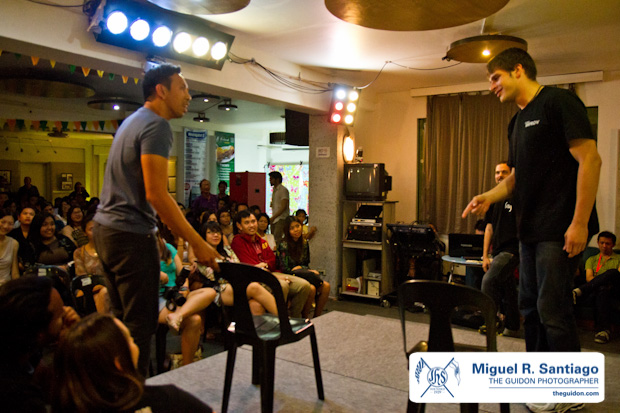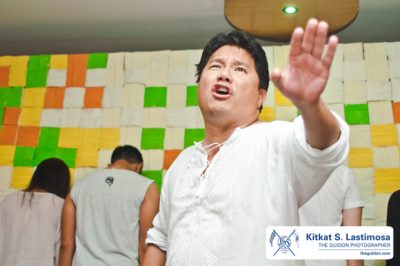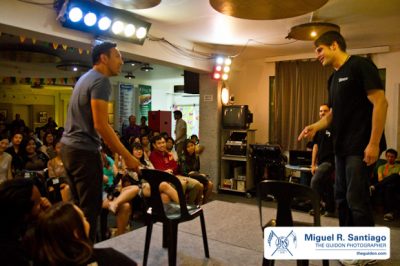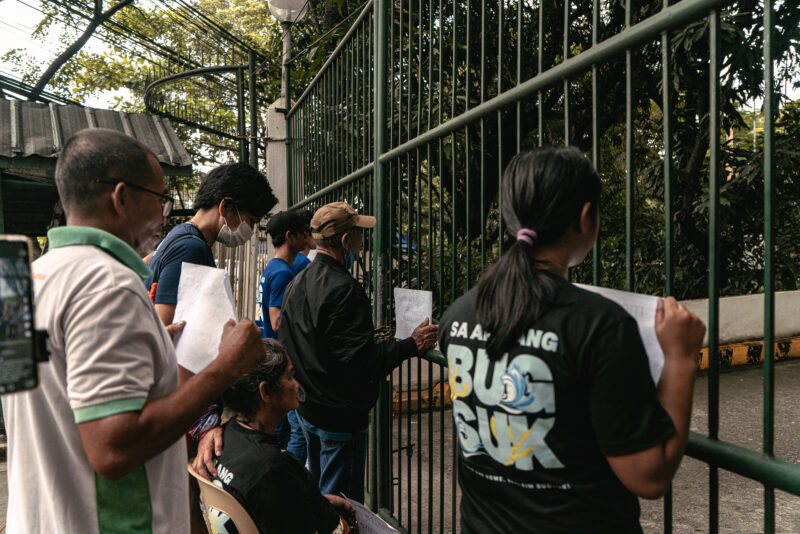
UNSCRIPTED ENTERTAINMENT. SPIT performs at the Quantum Café for the 2012 Manila Improv Fest. Photo by Miguel R. Santiago
There are no secrets here: a man on keyboard sits comfortably near the stage, beer in hand. Another mans the audio board. There are no passageways backstage, connecting stage left and stage right.
Performers relax on the floor, and stand once introduced. They turn to the audience and ask: A province in the Philippines. A kind of music. A setting. A word. Any word.
The audience shouts out in response. “Masbate!” “Electronica!” “Nuclear power plant!” “Panda!”
One of the performers reaches out for a word. The other performers may not be in agreement. But he reaches out for it, and they begin: a story involving an heiress from Masbate. A story peppered with dialogue sung in electronica. A story set in a nuclear power plant. A story of a wild panda epidemic.
Or maybe not. Maybe the story is that Masbate sinks into the sea. That Daft Punk rewrites the national anthem. That a school now stands where the nuclear power plant did, its students assured of radiation poisoning. That pandas are actually Chinese spies disguised to infiltrate governments all over the world.
Then again, maybe not. No one knows. Not even the performers.
This is improv.
Controlled chaos
Improv—shorthand for “improvisational theatre”—is a performance art quite unlike more common musicals or plays. Its distinctive feature is audience interaction: performers take audience suggestions and recommendations as the foundation of the story they build onstage.
The beauty of improv is that the performers never know what the audience will throw at them: for one show, they could be trapped in a snowstorm on an abandoned leprosy colony; for another, they could be running all over Manhattan, hunting down L’Occitane moisturizer for Kanye West. Director and founder of acclaimed Philippine improv group Silly People’s Improvisational Theatre (SPIT) Gabe Mercado likens “that special tension between the actor who doesn’t know the audience and an audience willing to challenge the improvisers,” to walking a tightrope. While the structure or format may be pre-planned, content and direction are truly improvised on the spot.
Improv is also hinged on the performers’ onstage awareness—their ability to listen as the story develops. Ateneo graduate and SPIT member Aryn Cristobal maintains that because there are no props, scripts or pre-arranged gimmicks, “teamwork is essential. It’s never just about you; it’s about the people on stage, and the audience that you are technically acting with.”
Valley between cultures
The uncertainty involved in improv is a challenge most people wouldn’t be up for—perhaps one of the reasons improv is definitely not a mainstream entertainment choice for Filipinos. While SPIT has a following for their weekly performances at Quantum Café in Makati, the idea of not knowing exactly what you’re going to get frightens people who have had the same karaoke song for the last ten or so years—which is ironic, considering SPIT’s understanding and integration of Filipino humor is dead-on.
Filipino Department faculty member and SPIT actor Ariel Diccion shares that SPIT’s grasp of the Filipino psyche is due to their own experiences as such. For example, when he makes a religious joke during a performance, he knows it’s something Filipinos will find funny. With foreigners, however, “ang naiisap nila, ‘Pucha, Catholic country ‘tong Pilipinas, bakit sila tumatawa tungkol sa religion (Shit, why are Filipinos making fun of religion when they are supposed to be a Catholic country)?’ The same way na when I arrived in Beijing, ‘Pwede bang pagtawanan ang communism? Kasi baka mamaya kung magpatawa ako tungkol sa communism, baka mabugbog ako (Can I laugh at communism when I’m in China? I’m afraid that if I do, I might get beat up)!’”
Diccion has performed at both the recently concluded Manila Improv Fest 2012 and in Beijing, where he is currently based on a language exchange program, with the Beijing Improv Group. He points out that this cultural divide is a learning experience: that the folly of man stems from each person’s own experiences, a reference to the elusiveness of universal truth.
Without borders
With improv literally a stage for candidness, it wouldn’t be unimaginable for performers to bring in bits and pieces of their own lives into the show. Diccion emphasizes the importance of reading, listening to the news, and generally going out into the world because they contribute to the knowledge bank that act as their reference points when onstage. This comes especially in handy for moments when audiences throw unusual concepts at the improvisers.
Blue Repertory president and senior communication major Tina Ramos points out that this holds true even for other theatre forms, citing her organization’s 2010 production Edges as one that hit especially close to home. “We really had to dig deep into our own personal lives,” she says. “The songs were about growing up, dealing with a big brother or big sister. You use your own stories to show people.”
What is perhaps more interesting, however, is that this is also applicable vice versa. Just as there are few limitations to what can happen during a show, improv itself is not confined to the stage. Improv’s core philosophy is to say, “Yes. And…” to whatever direction a story takes, or, by extension, wherever life takes the actors themselves.
Adapt and survive
The “Yes. And…” philosophy, however, isn’t simply about acceptance of circumstance; of equal importance to the “yes” is the “and…,” which calls for expansion, addition, collaboration. Mercado’s own experiences show his own faith in this philosophy: his marriage to a member of SPIT ended in 2006. “But,” he bounces back, “my decision to ‘Yes. And…’ the emotions—to ‘yes’ what was going on, ‘and’ integrate it into the characters—you’re not fighting things, you’re going with things and using them.”
In improv, saying “yes” puts one in a passive position, but the development of the “and” is what pushes the story forward. Improvisers have taken this mindset to their personal lives, giving new meaning to the Shakespearean declaration that all the world’s a stage.
As Diccion says, with all the flair of someone who welcomes every twist with a turn of his own, “Ang script ko ay ang buhay ko (My life is my script).”
- Photo by Kitkat S. Lastimosa.
- Photo by Kitkat S. Lastimosa.
- Photo by Kitkat S. Lastimosa.
- Photo by Kitkat S. Lastimosa.
- UNSCRIPTED ENTERTAINMENT. SPIT performs at the Quantum Café for the 2012 Manila Improv Fest. Photo by Miguel R. Santiago













